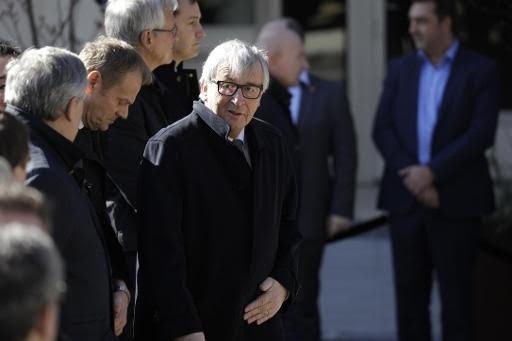The Brussels attacks on 22 March claimed the lives of 32 civilians and 3 suicide bombers and injured more than 300 people. One year after the terrorist attacks at Zaventem airport and Maalbeek metro station, European Commission President Jean-Claude Juncker issued a statement of hope in memory of the victims. “These loathsome terrorist attacks struck at the very heart of Europe here in Belgium, in our capital, Brussels – a multilingual and multinational city where we enjoy living together in harmony,” he said. “Faced with this unprecedented and incomprehensible violence, those of us living in Brussels and Belgium, with the support of all the peoples of Europe, chose to stand firm and not lose hope.”
“During this terrible ordeal, Europeans stood together in the fight against terrorism that threatens our safety and peace throughout the world. We showed our determination to defend our values and our freedoms no matter what.”
“That is why the terrorists have failed, because we have responded to hate and violence with a renewed determination to defend democracy and peaceful coexistence in diversity,” Juncker said.
Timely to the first anniversary of the Brussels attacks, two think tanks in Brussels have published anthologies with papers on the terror threat in Europe and on counterterrorism measures.
Thomas Renard, senior research fellow at Egmont Royal Institute for International Relations, gives an overview of events during 2016 when terrorism was an issue of major concern for Europe. He counts at least 10 attacks in Europe related to the Islamic State (IS) last year.
The Brussels attacks were the only successful sophisticated plot in 2016 as they involved an international network of individuals connected with the November 2015 Paris attacks, coordinated bombings in two different locations and the use of homemade explosives. It was also the only successful plot involving foreign terrorist fighters (FTF) who had returned to Europe.
However, a number of plots either failed or were foiled in 2016. While reliable figures are unavailable for the whole of Europe, intelligence and political statements indicate that the number of failed or foiled plots was significantly higher than the number of actual attacks.
According to security sources, there are more than 5,000 foreign terrorist fighters from the EU, of whom approximately 30% have returned to Europe and 15% have died. In continental Europe, the countries most affected are France (around 1,900), Germany (800), Belgium (550), Sweden (300), Austria (300), the Netherlands (250) and Denmark (130).
Renard observes that the number of ‘jihadi travellers’ seems to have dropped dramatically in 2016. “Thus, in 2016, homegrown and home-based radicalised individuals proved a major vector for jihad in Europe, whereas the focus had previously been more on foreign terrorist fighters”.
Because only part of Europe was directly affected by the threat of terrorism, most responses to terrorism in 2016 came from a core group of countries: Belgium, France, Germany and the Netherlands.
Without mentioning it explicitly, the threat of home-grown terrorism remains. Under pressure in Syria and Iraq, IS may be encouraging and directing “lone-wolves” to carry out terrorist attacks in Europe instead of joining a losing war in the Middle East.
Another think-tank, The European Policy Centre (EPC), published today (22 March) a book on the challenges of jihadist radicalization in Europe and beyond, with contributions by a number of experts.
According to the summary, all authors agree on one thing. In order to successfully address radicalisation and keep EU citizens safe from further terrorist attacks, intensified cooperation and intelligence sharing between member states, and between the EU and its partners, is an absolute must.
Equally important is that EU member states can offer marginalised and disillusioned youths at risk of radicalisation a better alternative, and promote a positive counter-narrative based on its own founding principles of freedom and democracy.
The Brussels Times

